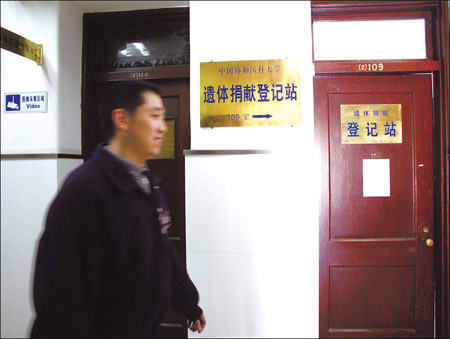Corpse supply remains dry for medical research
Medical colleges are complaining about a lack of corpses for study and asking for another 30 percent to match their needs.
 |
|
A body donation office at Peking Union Medical College. The city is in need of more corpse donations. |
"We received about 50 corpses last year for 60 freshmen taking anatomy classes. Among the three medical universities in Beijing, we were the only one to have enough," said a doctor surnamed Wang from Beijing Union Medical College. The school received almost half of the city's total donations.
Wang, who is in charge of donated bodies at the university, said the basic need of donations for teaching purposes in Beijing still far exceeded supply.
He also said the bodies available to his university only satisfied teaching purposes and not medical research. To cover both, they need at least 30 percent more.
"Few bodies were used for medical research because teaching is prioritized. However, clinical tests carried out on bodies are a very important stage of medical research and requires many corpses," he said.
Wang revealed how the other two medical universities - Capital Medical University and Peking University Health Science Center - welcome about 200 college students into their anatomy programs every year but were graced with less than 70 corpses.
Guo Lijie, director of the volunteer department at the Beijing Red Cross, said the current level of donations is too low in all universities and colleges. She confirmed that at least 30 percent more bodies were needed annually to handle demand.
Guo said in most low-tier medical colleges, only one or two bodies are available for study.
"The practice of donating bodies started in Beijing in 1999. At the moment, we are lagging well behind Shanghai," she said.
According to statistics from the Beijing Red Cross, from 1999 to 2009, as many as 11,696 people registered to donate their bodies after death. However, only 942 bodies were actually received. In 2009, medical colleges received 114 bodies.
To encourage more people to donate their bodies, NGOs are taking an affirmative role.
Love Storehouse, a group organized by would-be donors and founded in 2007, has now found more than 20,000 volunteers.
"Most donors have problems with family members to begin with, because the elderly believe being buried underground can bring good luck," said Ma Aiguo, a 30-year-old man who part-founded the NGO.
"Life is delicate and we should use it well. If donations can improve other people's lives, we should contribute ourselves," he said.
Love Storehouse now has 20 web groups in various cities, each with more than 1,000 members.
Cheng Yi, 39, is a new member of Love Storehouse who plans to register her body for donation soon. She joined the cornea donation project in Beijing in 1997 after getting the go-ahead from her 65-year-old mother.
"She was very supportive when I told her I planned to donate my body. We both believed it was much more meaningful to contribute what we have left after death to medical study rather than accept cremation. Benefiting others is a wonderful last choice," she said.
According to Wang, all bodies used in medical teaching are cremated and the ash buried under a tree.
"Gravestones for donors are set up in the city as a memory," Wang said.
 0
0 







Go to Forum >>0 Comments